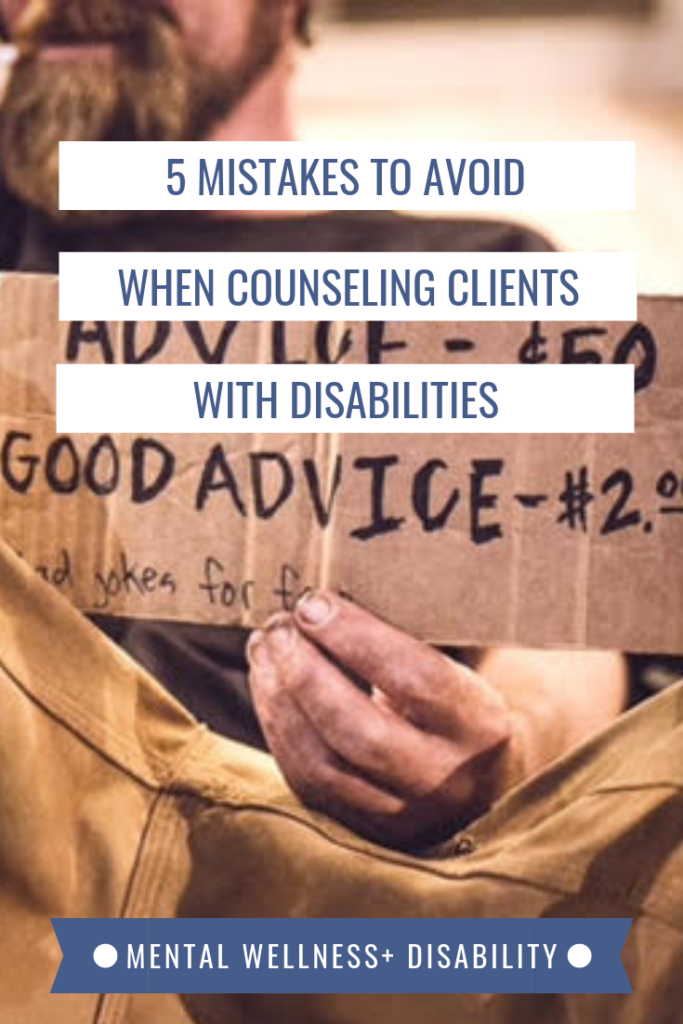Does counseling even work for people with Intellectual and Developmental disabilities?
Most of my counseling clients with I/DD have worked with other counselors in the past. They will tell me that they liked their former counselors, and that they liked having someone to talk to about their problems.
Yet when I asked them what skills their counselor helped them learn, or what changes their counselor helped them make, they can’t usually identify anything. Their parents or support professionals echo this.
They describe that other counselors may have offered “a kind, listening ear”. But they also say that there were few, if any, actual professional counseling interventions ever tried during sessions.
In my conversations with other counselors, I hear their version of what’s going on. They aren’t sure how much clients with disabilities are ‘getting’ from each session. They feel unsure of themselves, and sometimes even unsure that counseling can even work for clients with disabilities.
To all of the counselors out there who are unsure of where to go with their clients with disabilities, and to all of the parents and people with disabilities who have tried counseling but feel that it failed, let me first assure you:
Counseling CAN work for people with disabilities
I say this with confidence after helping many clients achieve their therapeutic goals. I use very basic, traditional counseling methods; no sand trays or elaborate play therapy set ups here! In fact, I do in-home therapy, so, sometimes all I have access to during sessions is what I carry in my bag. All that I do differently is to slightly tweak how I present and explain techniques so that it’s more accessible to my clients with disabilities.
Knowing that I can help my clients improve their coping, relationships, and communication through counseling, I know that other counselors can do it too. That’s why today I’m sharing some common mistakes to avoid when counseling clients with disabilities.
Diagnostic overshadowing
This is a fancy term that basically means, ‘letting disability be an excuse for everything else that’s going on, even if it isn’t explained by disability’.
How it typically plays out is that a client will do something, say wringing their hands. Teachers and parents believe this to be just another case of stimming behavior, consistent with the client’s Autism diagnosis. What they’re ignoring is that hand wringing is also a classic symptom of Anxiety disorders.
Sadly, many people with developmental disabilities who also have mental health disorders don’t often get their mental health needs met, because they’re not even recognized.
I meet countless times with people with are only diagnosed with Autism, but whose symptoms and behaviors clearly indicate something more than Autism. Whether they are experiencing Bipolar Disorder or Depression or Anxiety, these clients have usually met with psychiatrists and psychologists and medical doctors regularly for years, yet have never received a diagnosis beyond Autism.
Diagnostic overshadowing is also concerning when it affects someone’s medical care
If a client with Autism, bangs their head against the wall, it could be because of their Autism. But what if they have a headache? Maybe not a tremendous problem if they aren’t given Ibuprofen one day that they have a headache, but what if they have daily migraines? What if they have a brain tumor that’s causing pain? Major medical needs can easily go unmet due to diagnostic overshadowing, and the consequences can be tragic.
I realize I’ve used Autism in all of my examples so far; I don’t mean to suggest that diagnostic overshadowing only affects people with Autism.
In my experience, more signs of mental health troubles get lumped under the Autism diagnosis than any other. But I’ve seen plenty of people with Intellectual Disabilities, Cerebral Palsy, Prader Willi Syndrome, and other disorders be victims of diagnostic overshadowing. In truth had a genuine mental health or medical diagnosis that was being ignored.
Avoiding diagnostic overshadowing as a counselor is simple
Make a conscious effort to treat clients with disabilities exactly as you’d treat any other client. Suppose a client started furiously rubbing their eyes, and it caused their eyes to turn red and teary for days on end. I imagine you wouldn’t just chalk that up to their anxiety or whatever mental health condition they’re seeing you for.
You would ask them about this new behavior. You’d tell them it concerns you, research possible causes. Perhaps you would even call an emergency contact if your client has authorized you to do so.
You would follow your code of ethics, which obligates you to prevent harm to your clients to the best of your abilities.
It’s just that simple when your client has disabilities. Refuse to allow disability to explain what you see, and always be questioning if your client is trying to communicate something else, either a physical or psychological struggle, with their behavior.
Not researching the disability
Say you’re a marriage counselor, and you start working with a new client from Rwanda. As this client describes their courtship and marriage, they use terms and describe ceremonies that you’re not familiar with.
A crummy counselor is going to write this off as ‘cultural difference’, and try to get to the root of the problems in the marriage now. A counselor worth their salt is going to recognize that the client’s culture informs the context their client has for marriage. Great counselors research what they don’t know to better understand their clients.
Disability is just another thing your client brings to the table that can help you better understand them in the context of where they come from.
Don’t be shy in admitting what you’re not familiar with; ask questions of your client directly, or their family or support workers. Read a few journal articles AND few posts on a support forum specific to that disability, so you get a full picture of the challenges that your client might face on a daily basis.
Not building appropriate rapport
What I mean by this is engaging with your client as though they are a certain age based on their IQ or their communication ability or even their self-identified interests.
Sometimes you will meet a 50 year old with Intellectual Disabilities who is wearing a cartoon character shirt more appropriate for a 5 year old.
Sometimes you will meet an 18 year old with Autism who only wants to discuss trains, and keeps circling back to talk about trains when you’re trying to ask them about the types of jobs they’d like to apply for now that they’ve graduated from high school.
Sometimes you will meet a 30 year old who is nonverbal, and who communicates by pointing at pictures of common items and people on a board they carry around.
I assure you, each of these people have had a sexual fantasy. There is some relationship in their life they’d like to improve. They’d like to change their job or their living situation.
If your client is an adult, they are an adult
This is true even if a client communicates using simple words and sentence structures. Even if a client seems to only want to talk about one topic, that is certainly not the only thing on their mind.
Recognize the limited power your client may have in their day to day decisions. That childish shirt may have been a present from a parent who refuses to accept that their child is an adult. Or they may have been encouraged to buy it by a well-meaning support professional, who knew that they needed a new shirt, but could only afford something from the clearance bin.
Maybe the non-verbal 30-year-old has a significant other that you don’t know about, because their guardian thinks that them having a romantic relationship is ‘inappropriate’, and so doesn’t allow their picture on the communication board.
If you refuse to engage your client as who they truly are, and not simply as who others present or tell them to be, you’re never going to develop a truly authentic relationship with them.
Avoiding this kind of discrimination is again pretty simple.
Don’t skip questions on your intake because you assume they don’t apply to someone. Don’t make small-talk about the weather on the way to your office because you presume that this client wouldn’t have watched the basketball game that aired last night that everyone’ s talking about today.
It’s really as easy as treating someone as you’d want to be treated. Though being ok with talking about trains is definitely an asset if you plan to work with lots of clients with disabilities!
Stopping at Empathy
Of all the mistakes to avoid when counseling clients with disabilities, this is the one that I see counselors make most often.
They aren’t sure what to say or do, they aren’t sure how to interact, and so they default to what they know will do their clients no harm.
They listen.
They empathize.
They stop.
Empathy in itself isn’t a problem, of course. The trouble is that these counselors are afraid to take the next step
Whether it’s challenging their client on a cognitive distortion, or assigning homework, or engaging in a role-playing session, I think many counselors are afraid that they will somehow hurt or confuse their client if they try to introduce new skills or ideas.
To this I say; how many times have you tried to paraphrase or validate the emotion underlying a client’s experience, only to have the client tell you that you misunderstood them. Probably at least a handful.
Did it ruin your therapeutic relationship? Was the client harmed by your mistake?
Probably not.
More likely, your client recognized that you were trying to understand them, and they appreciated your effort.
Then you readjusted your technique, tried again, got it right, and you both moved on from there.
That’s exactly how it can be when your client has a disability.
Don’t worry, they’ll let you know if they’re not getting it. They may not communicate explicitly and verbally that they aren’t understanding you. But watch for non-verbal cues; eyes glossing over, furrowed brow, silently mouthing words. Your client may be wordlessly telling you in any number of ways that you’ve lost them.
When that happens, just regroup. Present the information in a different way. Or ask them to explain it back to you so that you can see where they’re getting lost.
Yes, it can take significantly more time than you may be used to to effectively present interventions to people with disabilities. It can certainly take longer for clients with disabilities to experience genuine therapeutic change as a result of counseling.
But if you stop at empathy, they will almost certainly never reach that point of positive change.
Not reworking your Process
What is ‘your process’? Anything your client interacts with!
The words you use during sessions, the worksheets you hand out, the little water feature in your waiting room.
If any of these things just isn’t working for your client, you’ll probably need to change them. Perhaps the words you use are too abstract, and your client responds better when things are explained very concretely. Maybe your client has a visual disability, and can’t read the fine print instructions on your handout. Perhaps the water feature, though intended to induce calm, is actually very irritating to your client due to their sensory processing disorder.
If making those changes doesn’t sound like it’s for you, like it will be too much work, then counseling clients with disabilities may not be for you either.
Adaptation and flexibility are usually very hard for people with disabilities. As a counselor who only sees clients with disabilities, I know that these are two things that I absolutely must bring with me to every session, to compensate for the fact that my client typically won’t.
My clients often struggle when things are new and different. I know that I must be the one willing to try new and different ways to help them understand what I’m explaining. That may mean revising a worksheet to meet their unique needs or explaining the same concept 10 different ways until it’s clear. If it gets my client to where they can process and move ahead with a new skill in their coping arsenal, it’s worth it.
I’m so curious to know, have you had experiences counseling clients with disabilities? Do you have other mistakes to avoid when counseling clients with disabilities that you could share with fellow counselors? Leave a comment and let me know, I’d love to hear from you!
Keep reading
Other posts you may be interested in
How to Know if Someone is a Real Friend. A Quiz for Teens and Adults with IDD.
In my counseling practice, I offer mental health counseling for teens and adults with IDD. Many of my clients who have Down syndrome, Cerebral palsy, and other disabilities have lots of meaningful friendships in their lives. But sometimes, they ask “how can I know if someone is a real friend?” Maybe you have a friend […]













